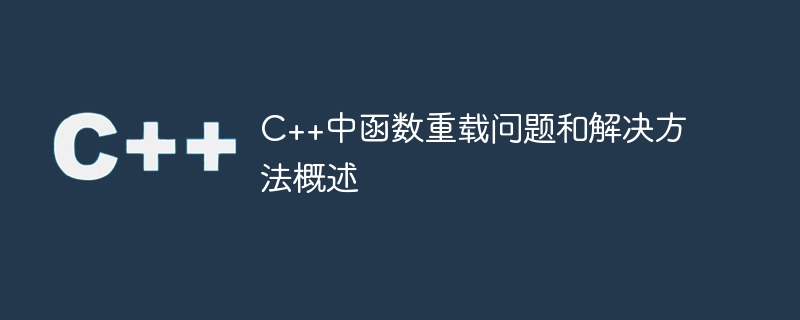Home >Backend Development >C++ >Overview of function overloading problems and solutions in C++
Overview of function overloading problems and solutions in C++
- PHPzOriginal
- 2023-10-09 15:04:501016browse

Overview of function overloading problems and solutions in C
Introduction:
Function overloading is a powerful feature in C that allows us to Multiple functions with the same function name but different parameter lists are declared in a scope. The benefit of function overloading is that it can increase the readability and maintainability of the code, while providing a more flexible programming method. However, function overloading may also cause some problems. This article will discuss the function overloading problems in C, provide methods to solve these problems, and give specific code examples.
Problem 1: Function call ambiguity
When function overloading exists, the compiler may be ambiguous when parsing the function call, that is, it cannot determine which overloaded function should be called. This situation usually occurs when the parameter types are the same, but the order of parameters of different overloaded functions is different.
Solution 1: Explicitly specify parameter types
When calling a function, you can explicitly specify parameter types to eliminate ambiguity. For example:
void printNumber(int num) {
std::cout << "Integer number: " << num << std::endl;
}
void printNumber(double num) {
std::cout << "Floating-point number: " << num << std::endl;
}
int main() {
// 明确指定参数类型
printNumber(static_cast<int>(3.14));
printNumber(static_cast<double>(42));
return 0;
}In the above code, by using static_cast to explicitly convert the parameters to a specific type, it is clearly specified which overloaded function is called.
Solution 2: Function parameter default values
Another way to solve the problem of ambiguous function calls is to set default values for parameters. By setting default values for some parameters, they can be omitted when calling a function, thereby eliminating ambiguity. For example:
void printNumber(int num, std::string message = "Number: ") {
std::cout << message << num << std::endl;
}
void printNumber(double num, std::string message = "Number: ") {
std::cout << message << num << std::endl;
}
int main() {
// 调用时省略参数
printNumber(42);
printNumber(3.14);
return 0;
}In the above code, by setting a default value for the message parameter, the parameters passed when calling are omitted, making the function call clear and eliminating ambiguity.
Question 2: Function overloading conflict
Sometimes, in the case of function overloading, the compiler may not be able to select the correct overloaded function, in which case a function overloading conflict occurs.
Solution: Casting
When the compiler cannot select the correct overloaded function, casting can be used to clearly define which function is called. For example:
void printNumber(int num) {
std::cout << "Integer number: " << num << std::endl;
}
void printNumber(double num) {
std::cout << "Floating-point number: " << num << std::endl;
}
int main() {
// 强制类型转换
printNumber((double)42);
return 0;
}In the above code, by forcing the integer 42 to double type, it is clearly specified that the overloaded function for printing floating point numbers is called.
Conclusion:
Function overloading provides a flexible and powerful programming method in C, but it also brings some problems. In the case of function call ambiguity and function overloading conflicts, we can solve these problems by explicitly specifying parameter types, setting default parameter values, or using casts. Proper use of these methods can better take advantage of function overloading and improve the readability and maintainability of the code.
The above is an overview of function overloading problems and solutions in C, and specific code examples are given. I hope this article can provide some help to readers when learning and using C function overloading.
The above is the detailed content of Overview of function overloading problems and solutions in C++. For more information, please follow other related articles on the PHP Chinese website!

